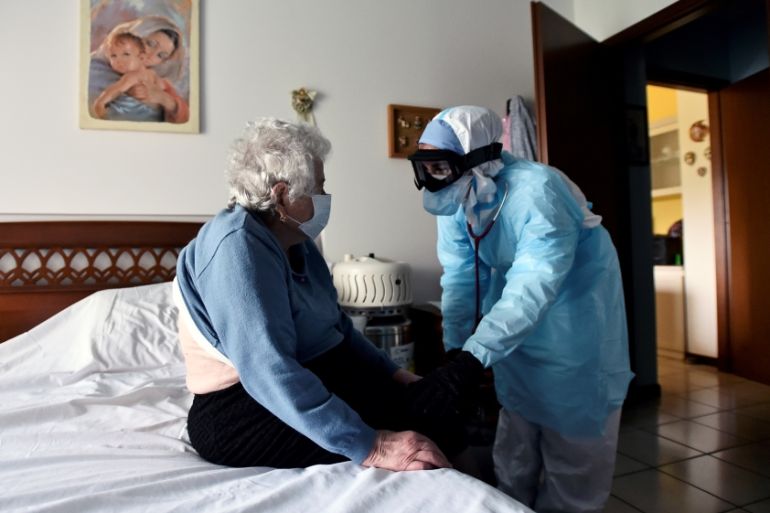Eastern European care workers in Italy thrust into uncertainty
Many migrants were fired amid fears they would spread the coronavirus or incriminate those who hired them irregularly.

Rome, Italy – On March 9, Natalia, a 50-year-old Ukrainian woman who provided care for an elderly Italian in Rome, went home after work as usual.
But the next day, she did not return.
Keep reading
list of 4 itemsMexico’s teachers seek relief from pandemic-era spike in school robberies
‘A bad chapter’: Tracing the origins of Ecuador’s rise in gang violence
Why is the US economy so resilient?
That night, Prime Minister Giuseppe Conte declared a national lockdown and Natalia found herself jobless.
Like other poor immigrants, she works without a contract and after Conte’s announcement, the family of her employer texted her to say do not show up to work tomorrow.
“I had heard of an epidemic in China, but China is far away,” she said.
|
|
In theory, the lockdown allowed housekeepers, babysitters and caregivers to go to work, but they were required to carry a statement from their employers.
Natalia’s boss would not issue such a statement.
“They were afraid that the police would find out that I am working without a regular contract,” she said.
She was suspended without pay.
Italy is now eyeing easing the lockdown, but as it was experiencing one of the world’s deadliest coronavirus epidemics, immigrant caregivers were particularly vulnerable.
Italy has one of the world’s oldest populations, with more than two million people aged 82 or above.
Such a large number of senior citizens, some of whom are no longer self-sufficient, requires the services of two million professional caregivers, according to Osservatorio Sul Lavoro Domestico, an institute monitoring domestic work.
Caring for the elderly is a demanding, poorly paid, job, largely carried out by women from Eastern Europe, especially Ukraine, Romania and Moldova.
“According to our report, 58 percent of domestic workers are working irregularly, without a proper contract,” said Massimo De Luca, a lawyer at the Osservatorio.
Amid the pandemic, without any legal protection, many have lost their income.
Some families have suspended their staff out of fears they could spread the coronavirus to the elderly, who are at high risk of the COVID-19 disease.
Other families, as in Natalia’s case, feared incrimination if police checked up on their cases.
Before the lockdown, Natalia earned about 1,300 euros ($1,400) a month, half of which was used to pay the rent for a small house on the outskirts of Rome where she lives with her husband, a bricklayer, who has also been forced to stay at home in the lockdown.
Luckily, she said, they had some savings.
“But the worst part is not knowing what the future holds for us.”
Because her status is irregular, Natalia was unable to receive any benefits unlike employees with formal contracts who have either still received pay from employers or government subsidies.
Experts say that many immigrants in Italy have few alternatives.
“If you don’t have a residence permit, you cannot be regularised,” said Luciana Mastrocola, an official of the union of domestic workers, FILCAMS CGIL.
“Caregivers are the most fragile category on the Italian job market and at the moment they have no income support.”
She noted that, in the past, Italy used to declare amnesties to undocumented immigrants working as housekeepers and caregivers, but the instance of this dates back to 2012.
“Right now caregivers lack any protection,” said Alfonso Angrisani, who heads Alec (Association of non-EU and community workers), a group advocating for migrant workers’ rights which has set up a hotline for domestic workers in difficulties.
“We’re getting so many calls from people who don’t know what to do.”
Angrisani said many unemployed caregivers have been trying to return to their home countries, but this has not always been possible since borders were closed.
According to Italian news reports, in March, two buses carrying Ukrainian migrants who were trying to go back home was blocked at the border with Slovenia, since the Balkan country had closed its border with Italy.
“Many of those who are jobless and cannot go back to their countries are becoming homeless or turning to homeless shelters,” said Angrisani.
|
|
This situation hit Maria (not her real name), a 47-year-old Romanian woman who used to work as a caregiver in Venice. She found herself jobless and homeless in February.
The elderly woman she cared for at her house was moved to a nursing home when the outbreak began and no one else would hire her, because of the virus.
“I had no job and I could not pay the rent, I was desperate,” said Maria. “I used to send most of the money back home to my daughter, who’s a single mother with a young boy.”
Without any savings, Maria’s only choice was to go back home: a friend lent her 300 euros ($326) to board a special flight organised by the Romanian embassy.
Back in Romania, her entire family is now living on her elderly mother‘s slim pension.
“I hope to return soon to Italy,” said Maria. “I need to earn money for my daughter and my grandchild.”